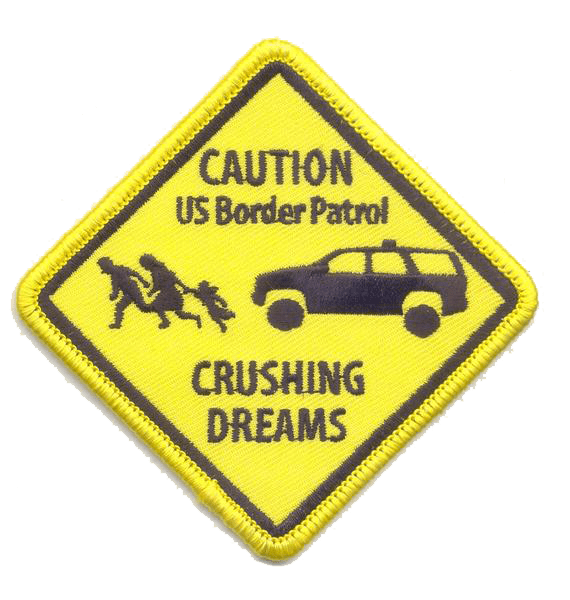What’s It Like to Work for the Border Patrol?
Phil Defer, American Renaissance, December 18, 2020
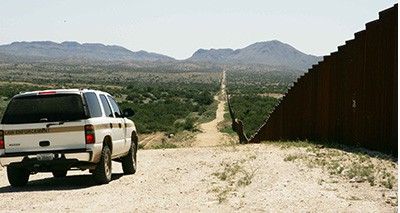
Phil Defer joined the Border Patrol in the 1990s. First stationed in the Rio Grande Valley Sector, he later worked on the northern border, and then again on the southern one. He retired relatively recently. This interview was conducted by email and has been edited for length and clarity.
What is your background? Why did you join the force?
I guess I was always somewhat politically minded. Even before I joined the Border Patrol, I was contributing money to anti-immigration causes. I read a lot of true-crime books and fantasized about becoming an FBI Special Agent or working for some other federal law-enforcement agency. I did an internship where an FBI agent told me that if I didn’t have computer skills, a CPA, a law degree, and didn’t speak an “exotic” language such as Thai, Arabic, or Farsi, then the only way to get into the federal side of things was to start off at the local level. I ran across a flier advertising the Border Patrol and was intrigued. I didn’t grow up near a border, and it had never really occurred to me that we had a federal agency securing the border. I applied and was hired — the rest is history.
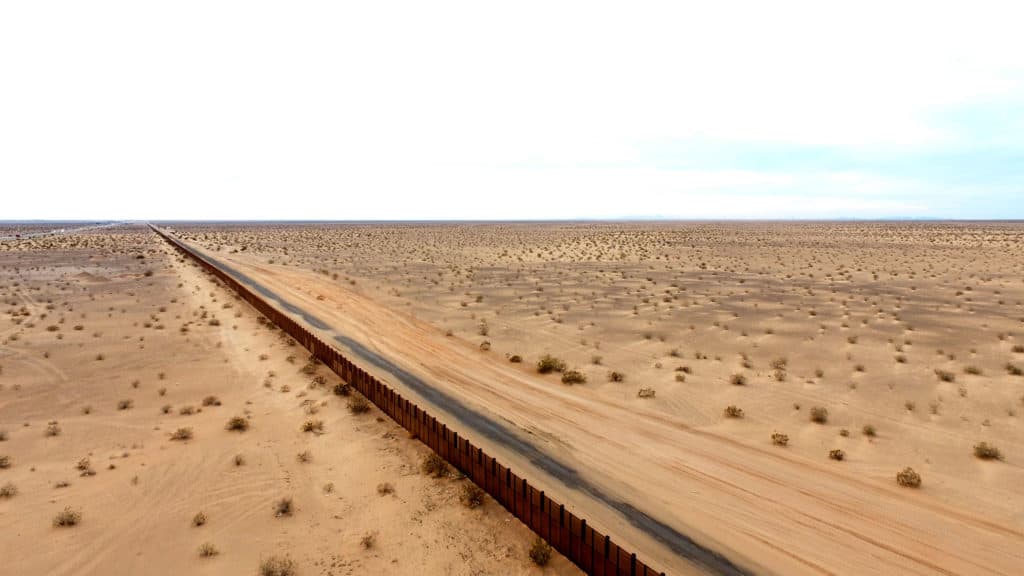
The wall that divides Mexico and the United States in the Mexican state of Sonora. (Credit Image: © [E]David De La Paz/Xinhua via ZUMA Wire)
That’s a mixed bag. Some of the best agents I knew were Hispanic. It’s hard to describe unless you’ve been there, but some of it is like a sport or a game. Those who are competitive and want to win will track down illegals for hours. The Border Patrol is around 80 percent Hispanic. That stuff about it being 50 percent Latino is hogwash. That being said, the corruption was far greater among the Mexican-American agents than any others. Part of it is that there are more of them, but part of it is that there are agents whose heart is not totally in their work. For many on the southern border, a Border Patrol agent’s job is the most money anyone in their extended family has ever made. They get paid whether they make an arrest or not. I knew many agents who never really did any work, and they never seemed to get punished for being lazy or incompetent. In fact, some really lazy agents I knew got promoted despite everyone knowing what slugs they were.
Do illegals ever make a racial/national appeal to Hispanic agents to get preferential treatment or outright release? How often do these appeals work?
Obviously, they never made that sort of appeal to me except in reverse — I got called racist more than a few times. For the Hispanic agents, they did get appeals that they were all part of the same raza, so why are you arresting me? At night, we were paired up with other agents for safety reasons, so I worked with a lot of Hispanic agents. I never heard any of the illegals make a direct appeal to race in order to get released, but I did hear of other agents who did. It did not appear to be all that common.
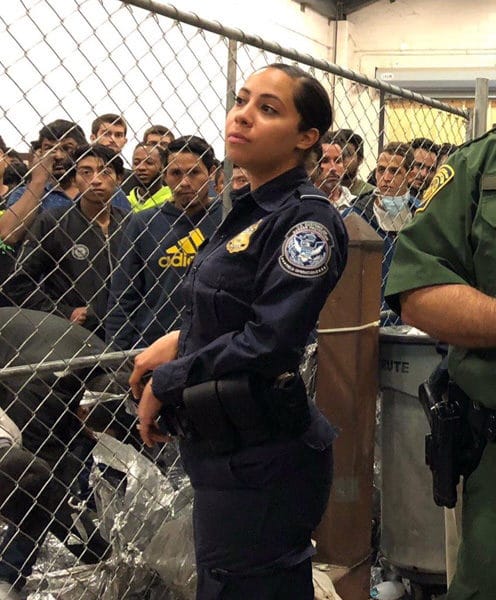
“ICE Bae” — perhaps the most famous Hispanic working in immigration enforcement.
How often do encounters with illegal aliens get violent? Were you ever attacked by one?
I was never really attacked. I did have a standoff with one alien. I had my collapsible steel baton out and was trying to get him on the ground to cuff him. He was refusing and sort of squared off. My backup arrived, and the illegal decided that two against one wasn’t going to turn out in his favor and surrendered. Coming into the Patrol, I had expected things to be far more violent. I think it was not as violent as I had expected because the majority of people we were arresting were Mexican and they just got sent back to Mexico to try again. Why get into a confrontation with an agent and risk getting sent to jail?
But I did get rocks thrown at me all the time. We had an area nicknamed “Rock Alley,” and we got rocks thrown at us there on a daily basis. Once when I was on foot not too far from Rock Alley, I came across a group of Mexican teenagers who had swum onto our shore probably looking for inner tubes that they would use to smuggle people across at night. I was on top of a steep incline, almost a cliff. They asked me if they could come up to grab one of the inner tubes that had been left on top of the cliff. I told them no. Their ringleader turned to his compatriots and said in Spanish there are five of us and only one of him. At that, they charged up the embankment in a single file. At the very top, they had to get down on all fours because of the incline. I drew my handgun, and the first one up saw the barrel right in his face. He screamed “AYE!!!! La pistola!” and the five spun around and went back down.
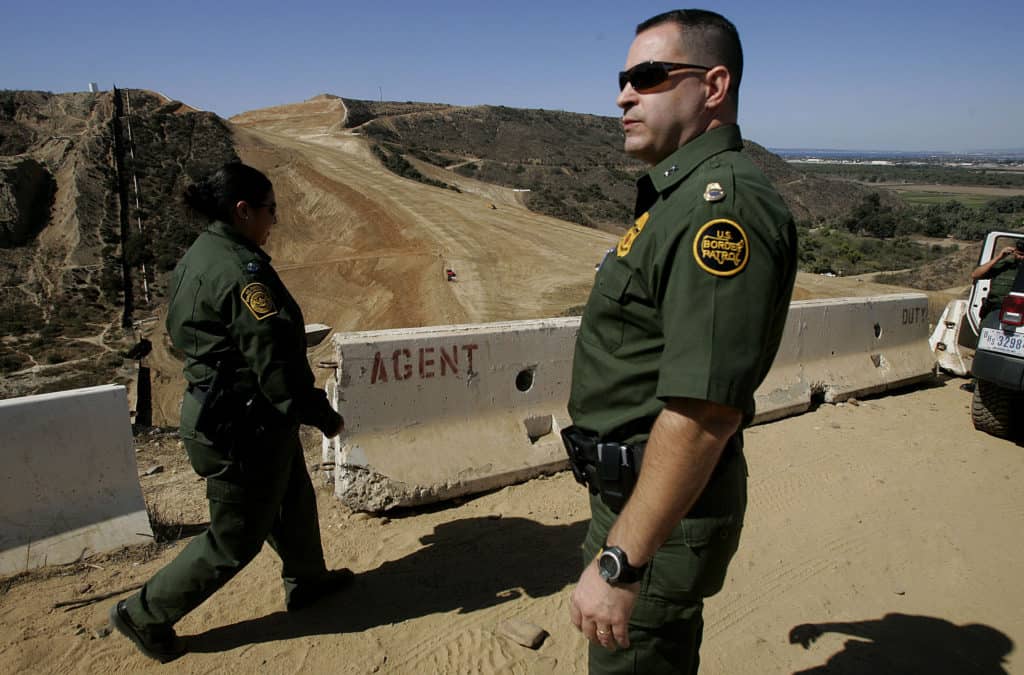
Credit Image: © Sandy Huffaker / ZUMA Press
Do agents ever shake lady illegals down for sex?
Not in my experience. Once, an agent I knew claimed he saw a Mexican-born agent arranging a date with one of the Mexican women who was being transported back to Mexico. I suspect other agents may have done some similar things.
How often do illegals offer them sex or money to be turned loose?
Not often enough. Just kidding. It doesn’t happen all that often. The few times I’ve heard of it, it seemed like the women picked Nativos (native speakers of Spanish) who were rather ugly. I think their logic was that an ugly man would feel more privileged for having been asked. I did hear of a case near the checkpoint to the north of us. The agents there busted a woman, and she solicited one of the agents. The agent told her no way, that he could lose his job for that. She responded, “That’s not what the last agent said.” Internal Affairs set up a sting and busted the previous agent at a motel. One of my friends was solicited right in the processing room while he was writing up a woman. He told her no, he was married, and then he continued, “Besides, you’re ugly.” That shut her up and she quietly sobbed while he wrote up her file.
What do agents think when administrations change, Democrat to Republican or back again? Are Democrats demoralizing? Does it make a difference on the ground?
The short answer is “yes.” It makes a difference knowing what the administration is trying to accomplish.
As with a military force, morale is extremely important. What happens in D.C. can have a huge impact out in the field. Strangely, the Clinton administration was somewhat pro-immigration enforcement. Now, Clinton did some tremendously demoralizing things like offering Temporary Protected Status for Hondurans after a hurricane there. However, Janet Reno actually supported enforcement. When George W. Bush came into office, no one was really sure what to expect. When September 11th happened, I remember discussing with other agents whether they would “take the cuffs off” (of us) and let us start doing some raids. Almost the complete opposite occurred.
I think that some civilians believe that if you are willing to invade a foreign country, you must be pro-immigration enforcement. President Bush proved that wasn’t true. He was the original “Invade the world, invite the world” executive. For Mexicans, we would often send them right back the same day they were caught with what was called a Voluntary Return or “VR.” The idea was that there were so many of them that if they all went to court they would overwhelm the system. So instead, they could agree to go back the same day and avoid any penalty. Conversely, if they refused to be sent back, they would be held for court, which could take a few days and then have a trial before a judge. Most didn’t want to sit in jail. On rare occasions, they opted for the trial. At that point, they usually lost their case and got sent back anyway. Now, that was considered a deportation and not a voluntary return, and if they were caught again, then (in theory) they could be sentenced for up to five years of detention. The reality was that they usually got time served.
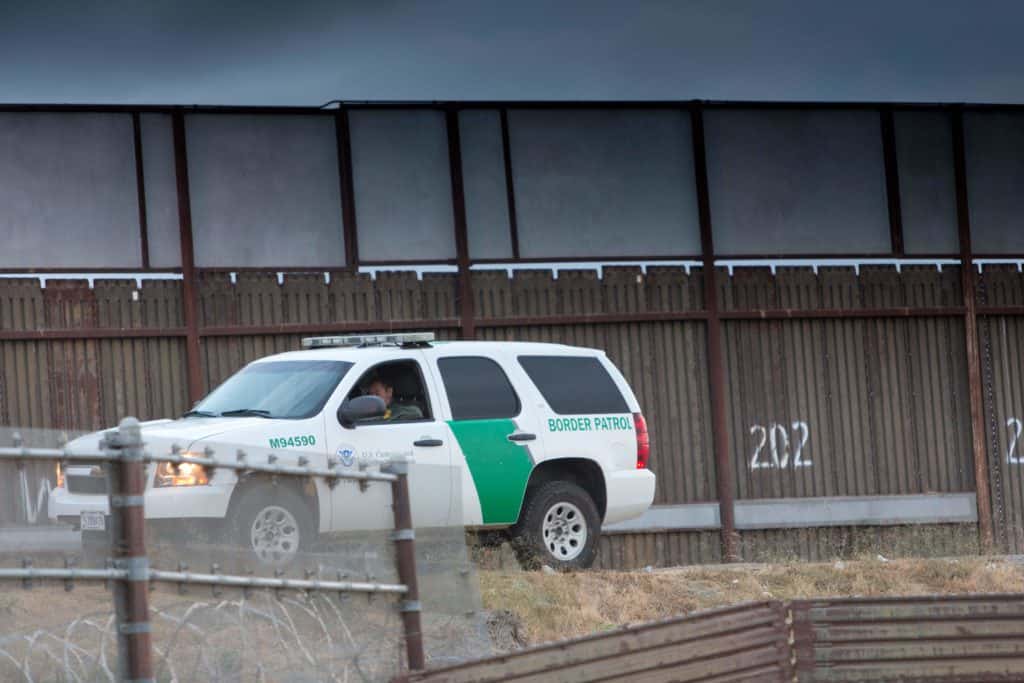
Credit Image: © Frank Duenzl / DPA / ZUMA Wire
Now, if you caught people who were not Mexican, the Mexican authorities would refuse to take them back. We were supposed to hold them at an immigration detention facility until their court trials were over and they fly them back home. This was a huge headache and required hours of paperwork. Also, sometimes the Central Americans would lie about their nation of origin and pretend to be Mexican in the hopes of being sent back to Mexico rather than going all the way back to Nicaragua (or wherever). Mexican-American agents were very helpful in dealing with this. They would catch these lies easily because of accents or the illegal not knowing some Mexican candy or other things only Mexicans seem to know.
President Bush let the money for putting illegals in detention centers dry up. What that meant was that everyone from Central America, Brazil, China, and wherever else was being “OR’ed” into the United States. That stands for released on their “own recognizance” with an order to appear in court at a later date. At the time, somewhere between 80 to 90 percent of aliens who were OR’ed into the U.S. did not show up for their court dates. As a result, we were inundated with people from all over the world coming in and walking out the door with paper orders. Talk about demoralizing! Because of this, at one point, my old station stopped patrolling the Rio Grande entirely. It was beyond bad. Most of us had signed up for an exciting career in law enforcement, and instead we were nothing more than bureaucrats turning out useless paperwork at a desk.
Making things worse, President Bush tried passing an amnesty at the same time. Thank God for Senator Jeff Sessions derailing that. Once the amnesty attempt failed, it became obvious that America didn’t want to do an amnesty without border security. The President appointed Michael Chertoff as Secretary of Homeland Security, and things changed a bit. By then, I had fled the southern border for the northern one. Mr. Chertoff said he was in favor of “comprehensive immigration reform” (amnesty by any other name is still amnesty), but he at least increased enforcement.
By the end of the Bush presidency, things had turned back around at least somewhat . . . then came President Obama — the fox was in the henhouse.

Diana Calderon, a student who has benefited from the Deferred Action for Childhood Arrivals (DACA) program, left, introduces President Barack Obama at a reception for the 25th Anniversary of the White House Initiative on Educational Excellence for Hispanics in the White House on Thursday, October 15, 2015. (Credit Image: © Ron Sachs/CNP via ZUMA Wire)
In the choice between Mr. McCain and Mr. Obama, it looked like a repeat of the Bush presidency with the former, while the latter was a wild card. I didn’t vote for either of them, but I know of agents who voted on both sides.
The Obama administration gutted enforcement. Before him, Border Patrol agents and ICE special agents often teamed up with local police. The police would get a noise complaint and discover a party with a bunch of less-than-legal revelers. After they sobered up in the drunk tank, they’d find ICE questioning them. The next thing they knew, they were in a detention center and then on a long bus ride back to the border or on a plane. The Obama administration got rid of this. When we still did catch an illegal alien, if he had no prior criminal convictions, bail bond would often be “re-determined” to zero, and he would be walked out the door. There are a lot of illegal aliens who have been arrested for DUI, trespassing, possession of marijuana, who move out of state after their arrest and show no convictions on their record despite multiple arrests. So illegals skirt the system. With no convictions, they were being walked out the door left and right. Morale plummeted.
However, President Obama wanted to make it look like he was actually securing the border. So he relabeled Voluntary Returns as deportations. Voilà: More deportations than any previous president with the simple stroke of a pen. The administration also did tricks like double-counting the same alien more than once. It was enforcement on paper. The press even cooperated in the deception by labeling him the “Deporter in Chief.” The immigrants’ rights groups bought into this myth and tried to get apprehensions reduced still further. My own relatives believed the president was increasing deportations, because that’s what the Washington Post and the New York Times told them. It was so frustrating for me, because my relatives chose to believe the lies in the press rather than me as an actual witness.
President Obama took advantage of any excuse he could find not to enforce the law.
At the end of his administration, word traveled around the world that if you came to the border with your child, you would be released into the United States. While border arrivals had been increasing since for years, the caravans started happening in 2014. Truthfully, they weren’t really caravans but just a steady flow of humanity coming out of Central America. Once these child-toting illegals were released into the United States, they called their relatives and had them come up, too. The resulting influx was why the Obama administration started building facilities to house family units. The original “kids in cages” started happening around 2014, but the press didn’t cover it back then.
When Donald Trump initially came into office, things started to turn around. Jeff Sessions, as attorney general, tried to secure the border. He didn’t get very far. The media, the Left, and dozens of nonprofits fought the administration tooth and nail. After the Democrat Party’s victories in the 2018 midterm elections, a lot of the progress President Trump made was undone — and Jeff Sessions was pushed out of the administration. The consequence was another flood of illegal immigrants, one so large that us northern border agents were forced to go down south to help process and release thousands of aliens. If you want to know more about it, read Michelle Malkin’s Open Borders Inc. or watch the PBS Frontline series “Zero Tolerance,” especially the interviews of Steve Bannon, Ann Coulter, and former Homeland Security Secretary Jeh Johnson.

Jeff Sessions (Credit Image: © Sait Serkan Gurbuz / Depo Photos via ZUMA Wire)
Are there any differences in the way agents of different races do their jobs? Who are the most diligent, most corrupt, lazy, etc.?
No doubt about it that the most corrupt are the Hispanic agents. There are more of them, and they are closer to their ancestral homeland, being asked to stop people who look like them, speak like them, eat the same foods, and listen to the same music. I met an awful lot of lazy Hispanic agents. Whether they were lazy because they didn’t believe in the job or because they would have been lazy in any job is hard to say. Now, you would think that white Americans would be the best agents, but I will disappoint you. It seemed like the more obviously racially conscious a white agent was, the worse he was at the job. They seemed to retreat and bitch about the job but rarely make any arrests. I knew two agents who were regarded as racists when I was down south, and they both left for the Air Marshals. A surprisingly large number of people get into the Border Patrol for the paycheck and not because they believe in immigration enforcement. If you combine that with an administration that doesn’t believe in enforcing the law, then they feel justified in not making arrests.
Are there any differences in how immigrants of different races behave?
I didn’t see much of a distinction between different Hispanic nationalities. The Chinese I arrested were generally very polite. The Indians I arrested were more defiant. They didn’t fight, but they would try to stare you down. I heard later that Bangladeshis purposely try to stare you down as a means of exerting their superiority. Cubans were rude and nasty. I don’t know if it was caused by coming out of a totalitarian state, but they behaved like a criminal gang. I once heard about a group of them that guarded the Porta Potties in a detention center and started charging other aliens to use them.
When I was on the Canadian border, we were warned about the Albanians and Serbs. They had a reputation of wanting to fight. We once had an Albanian make not-so-veiled threats about killing a group of us agents.
How do people act once they’ve been busted? Do they cry? Do they fight? Do they negotiate?
Most don’t fight. One theory as to why is because the Border Patrol in days of yore was notorious for brutality. Also, the illegal aliens come out of countries where fighting with cops can get you killed very quickly. So they are reluctant to give any defiance. I can remember frisking a guy whose entire body was shaking in fear.
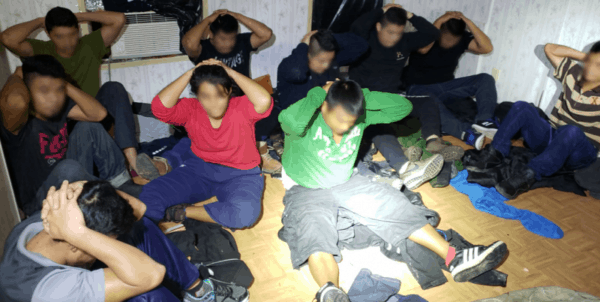
Illegal immigrants surrendering during a raid on a stash house.
Yes, they sometimes cry. They sometimes feign being sick and try to force themselves to vomit. That’s not usual, but it happens. Fortunately for me, if they tried to negotiate, my Spanish language skills suddenly deteriorated even more and they realized they weren’t getting anywhere. I remember one alien we caught each day for three days in a row. The last time I caught him, he was mad at me and saying that he had a wife and three kids at home. He wanted me to let him go. No way, José.
Was there ever a time you felt bad about having to detain or arrest anyone? Why?
Yes. I’ve felt bad about a few people I arrested. It makes a difference if an alien is nice or not, and I’ve met more than a few who I genuinely liked as people. It’s too bad some of them can’t stay and we can’t get rid of others. The one who really stood out was when I was in the office processing aliens. One agent brought in a man in his 30s and his 13- or 14-year-old daughter. The man had been caught about a dozen times before. Normally, after about six apprehensions, an illegal is given a formal deportation hearing. The agent doing the processing said, “We’ll fix that.” He was going to separate the two (as required by law) and send the father to jail to await trial. As the other agents were processing the father, I decided someone needed to process the daughter, too. I tried talking to the daughter and she gave me a blank stare. “Ella es sorda” — “She’s deaf,” her father said.
Looking down at this young girl and realizing that she did not know how to read or write or know any sign language, I couldn’t help but have a sense of extreme sorrow for her. Her entire world was simply trying to read people’s faces, and she gave me a look that haunted my psyche. We ended up sending the father and daughter back to Mexico. I remember the agent writing up in the file that they were being sent back with no prosecution for “humanitarian” reasons. I couldn’t blame the father for trying to smuggle his daughter into the United States. If he could get her to a program that would simply teach her sign language, it would make an incredible difference in her life. And that’s the one and only illegal alien I ever encountered who I sort of hope made it in.
Border Patrol and ICE put out several press releases a week. They often cover impressive busts of either violent criminals or huge quantities of drugs. But the mainstream media very rarely cover these actions. Why is that?
I’m not sure. However, even when some of those busts are posted on Breitbart or AmRen, they don’t seem to get a lot of comments. Perhaps the attitude from the general public is simply “good job” or “glad to hear it.” Personally, each time I see some of those busts I wonder how many got away. We always seemed behind the curve when it came to people flooding across the border.
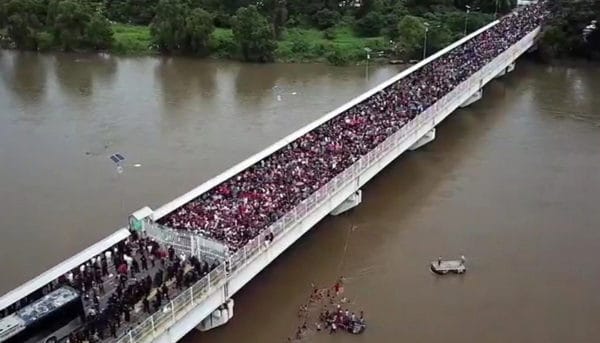
Keep in mind that with all those arrests that do get mentioned in press releases, there are often a lot of arrests being made that never make it into the news. If you want to be a hero in the Border Patrol, bust a dope load. I remember when one of our agents caught an illegal alien woman at the airport whose name was on the terrorist watch list. This was only a year or two after September 11th. However, another agent who busted a drug load got employee of the month.
Is there “anti-racist” training in Border Patrol as in many other parts of the federal government?
Oh yes there is. We used to get one “training” a year in a classroom-style setting. However, it was taking too many man-hours to pull people in from the field and designating someone to be the instructor. So now it’s all virtual training. Most agents regarded it as a joke. We would try to see who could scroll through it the fastest. Sometimes, they’d have quiz questions that you had to answer correctly before you could go on. The vast majority of us saw it as a joke.
How could the Border Patrol be more effective? Are there specific policies and practices that would make a big difference — or does it simply need more men, more equipment, etc.?
Policies made in Washington do make a difference. A Biden administration would be devastating. I don’t think agents would have any incentive to go out and catch aliens just to watch them walk out the door again. More agents and more equipment is always good. However, there’s no substitute for a quick, speedy trial that lands them in detention right away and deports them as quickly as possible.
The Border Patrol has always struggled with how to motivate agents to go out and make arrests. Making an arrest and then having to type up the results for hours can be demoralizing, especially when your file keeps getting amended and kicked back over and over again. Simplifying this process would help.
Some on the Right think the military should be put on the border — which other nations, including Mexico, do. Is this idea feasible?
The military is down there. Unfortunately, they are down there as humanitarian aid more than anything else. When the floods (the caravans) were coming through, the National Guard was there handing out ramen noodles and Hot Pockets for them to eat. For some reason, the National Guard is allowed to observe and refer illegal aliens to us, but they are not allowed to make arrests.
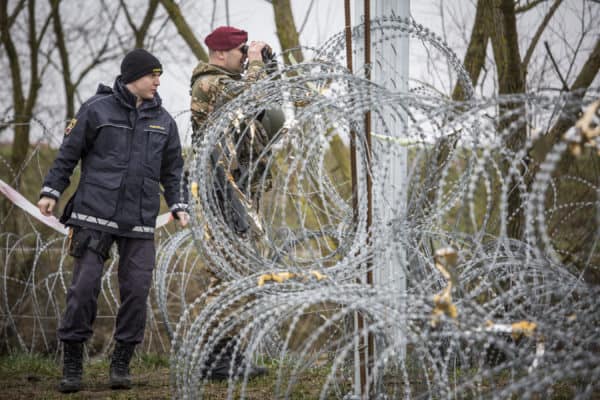
Slovenian soldiers patrolling the newly built border fence that separates Slovenia from Croatia. The fence was built in December, 2015, to keep undocumented migrants and asylum-seekers from illegally entering the country. (Credit Image: © Jodi Hilton / NurPhoto via ZUMA Press)
One of the Vietnam vets I knew when I first started out said that the Border Patrol should be part of the Defense Department. He claimed that after the military got through with detaining an alien, the alien wouldn’t want to come back. Keep in mind, the Border Patrol was once under the Department of Labor before going to the Department of Justice and then Homeland Security. Perhaps the Defense Department would have better luck motivating fat, middle-aged government employees to do their jobs. (One of the reasons the military is not down there is because of the Esequiel Hernández, Jr. case.)
Did you ever see any evidence that the Mexican government helps people cross the border? How much does corruption on the part of our neighbors lead to greater illegal immigration? Is there any degree to which mass immigration could be decreased through political change in Mexico City?
The Mexican military helps cross drug loads into the U.S. without a doubt. Wherever we saw their soldiers camped out along the border, we knew it was likely to be a drug zone. Mexico loves the remittances it gets back from Mexicans living in America. Mexico once had printed up brochures on how to sneak into the U.S. without getting caught and without dehydrating and dying. I was surprised the Trump administration was able to get Mexico to slow the flow. However, that might be because each Honduran in the U.S. is taking a job a Mexican would be doing.
It’s a poverty issue. As long as Latin America is poor and the U.S. is wealthy, they will continue to cross. Really, interior enforcement needs to be ramped up. E-Verify will help only so much because so many of the illegal aliens are paid off the books. Also, a contractor hires a subcontractor who hires a subcontractor that gives them plausible deniability that they were hiring illegal aliens.
Some “humanitarian” groups focused on immigration send their people to the border to hand out water, provide legal aid, etc. Did you ever deal with any of these people or know anyone who did? What are interactions between them and Border Patrol agents like?
That happened more out in Arizona. Since I was in Texas, I never had any dealings with do-gooders when I was on the southern border. On the northern border, I did encounter a church notorious for sheltering “refugees.” Most of the people staying at the church were in some sort of legal proceedings. Between that and our policy of not being allowed to go in churches or schools, we tended to stay clear of that area. However, it just encourages more people to try to do the same thing.
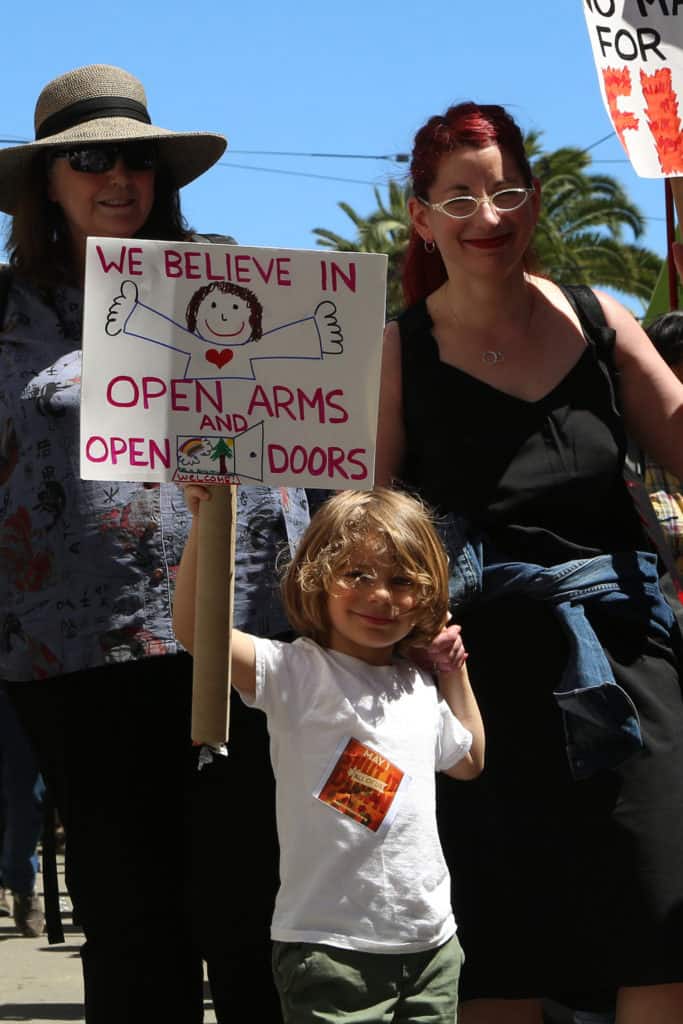
Credit Image: © Liu Yilin/Xinhua via ZUMA Wire
I did get into it once with a church lady who was part of some emergency migrant response team. If an illegal alien is busted, he can call their number and private citizens show up to harass you. Another time, someone tried taking a video of me making a bust and put it on social media. Fortunately, it was predawn and you couldn’t really see who I was in the low light.
Parts of the Left are pushing to abolish ICE and/or decriminalize border crossings. How would that change things?
Frankly, if they decriminalize border crossings, then why even have a border? Plus, with no ICE to do interior enforcement, no one would be getting picked up. I would say that it would lead to the destruction of the U.S.
What did you like best about working for Border Patrol?
Retiring. Just kidding. It was an extremely frustrating job. I don’t know how many people I caught, only to see them walk out the door. You risk your neck making an arrest. Nowadays, the younger agents doing transportation checks get filmed and wind up on YouTube with some idiot making fun of us. That discourages a lot of agents from working.
What I enjoyed was working with a good group of guys and we made a bust. I loved their stories. I loved hearing about how an agent defied our supervisors and got into a high-speed pursuit and made a bust despite them. I miss running down aliens after they scattered from a bust. I hated it when they got away, but it was so rewarding to grab them and ruin their stay. We had stickers that read “Border Patrol: Crushing Dreams” pasted around the office.
